Report on Principles of Health and Social Care Practices
VerifiedAdded on 2019/12/03
|12
|3807
|37
Report
AI Summary
This report delves into the core principles of health and social care, examining their practical application through a case study involving elderly individuals with specific needs. It highlights key principles such as dignity, independence, privacy, and choice, alongside procedures for protecting clients from harm, including confidentiality and relevant legislation like the Care Act 2014 and the Data Protection Act 1998. The report emphasizes the advantages of a person-centered approach and explores ethical dilemmas and conflicts, such as providing equitable care and support. Furthermore, it analyzes the implementation of policies, local procedures, and the impact of legislation, regulations, and codes of practice on organizational policies. The report also touches upon theories of human growth and development and their influence on social processes in diverse societies. Finally, it evaluates the effectiveness of inter-professional working, providing a comprehensive overview of critical aspects in health and social care practice.
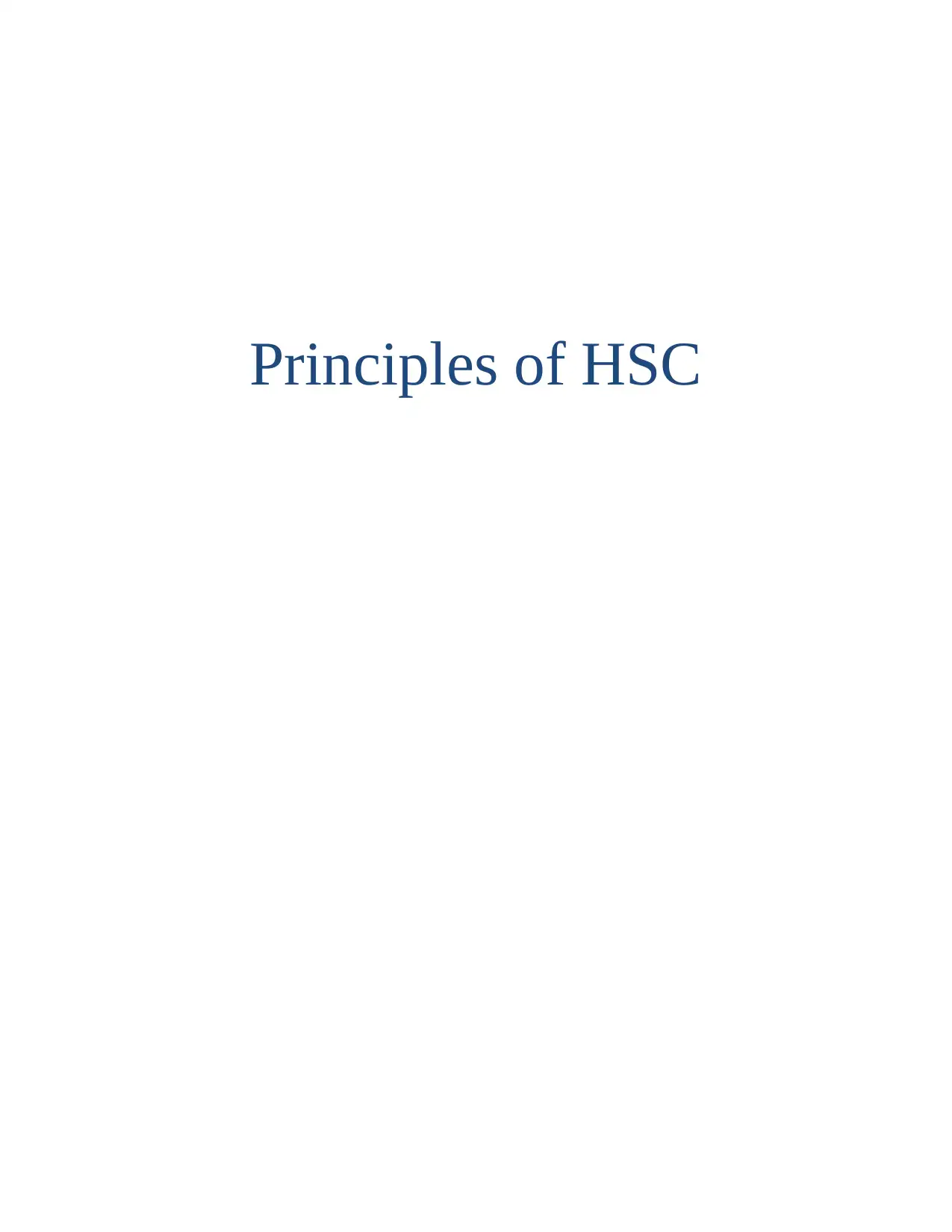
Principles of HSC
Paraphrase This Document
Need a fresh take? Get an instant paraphrase of this document with our AI Paraphraser
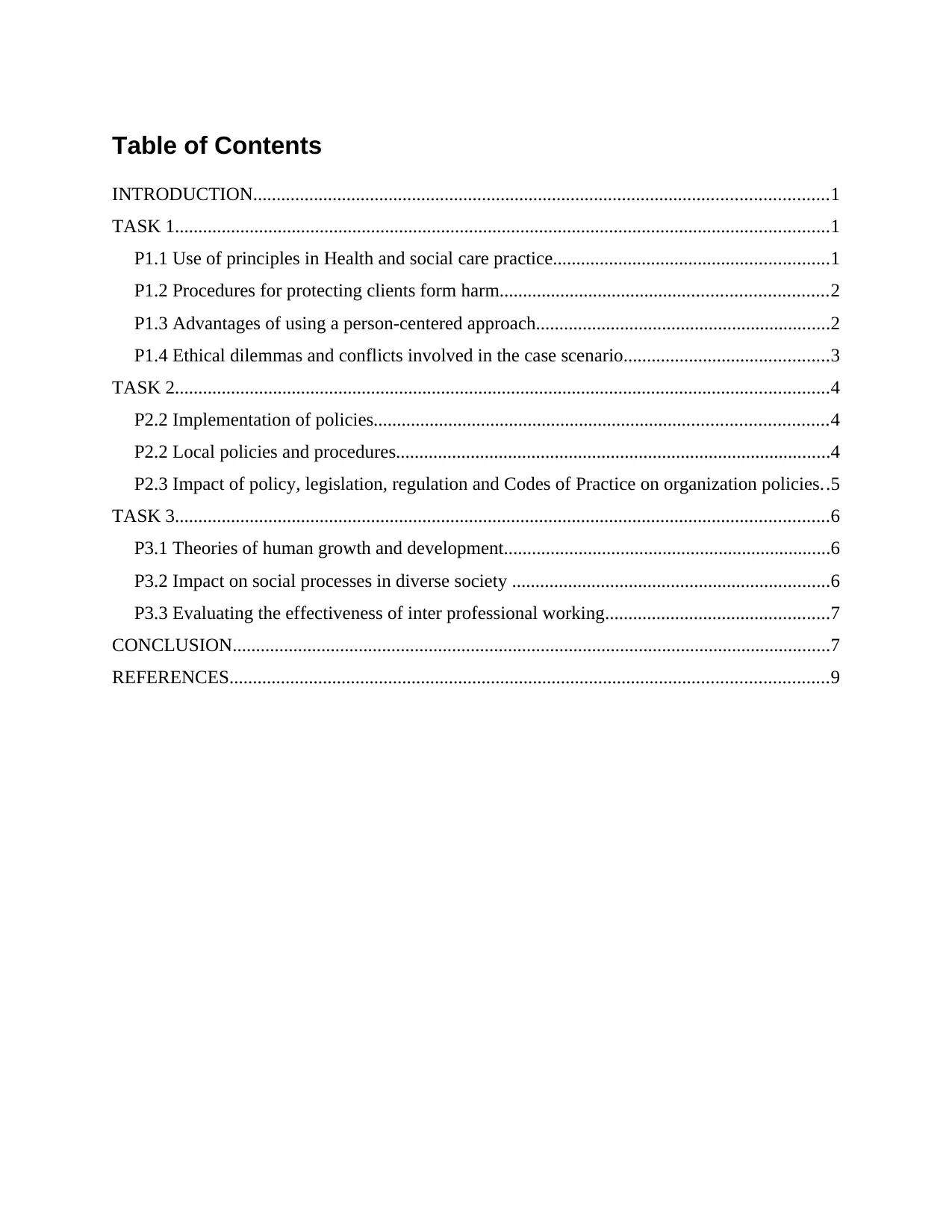
Table of Contents
INTRODUCTION...........................................................................................................................1
TASK 1............................................................................................................................................1
P1.1 Use of principles in Health and social care practice...........................................................1
P1.2 Procedures for protecting clients form harm......................................................................2
P1.3 Advantages of using a person-centered approach...............................................................2
P1.4 Ethical dilemmas and conflicts involved in the case scenario............................................3
TASK 2............................................................................................................................................4
P2.2 Implementation of policies.................................................................................................4
P2.2 Local policies and procedures.............................................................................................4
P2.3 Impact of policy, legislation, regulation and Codes of Practice on organization policies..5
TASK 3............................................................................................................................................6
P3.1 Theories of human growth and development......................................................................6
P3.2 Impact on social processes in diverse society ....................................................................6
P3.3 Evaluating the effectiveness of inter professional working................................................7
CONCLUSION................................................................................................................................7
REFERENCES................................................................................................................................9
INTRODUCTION...........................................................................................................................1
TASK 1............................................................................................................................................1
P1.1 Use of principles in Health and social care practice...........................................................1
P1.2 Procedures for protecting clients form harm......................................................................2
P1.3 Advantages of using a person-centered approach...............................................................2
P1.4 Ethical dilemmas and conflicts involved in the case scenario............................................3
TASK 2............................................................................................................................................4
P2.2 Implementation of policies.................................................................................................4
P2.2 Local policies and procedures.............................................................................................4
P2.3 Impact of policy, legislation, regulation and Codes of Practice on organization policies..5
TASK 3............................................................................................................................................6
P3.1 Theories of human growth and development......................................................................6
P3.2 Impact on social processes in diverse society ....................................................................6
P3.3 Evaluating the effectiveness of inter professional working................................................7
CONCLUSION................................................................................................................................7
REFERENCES................................................................................................................................9
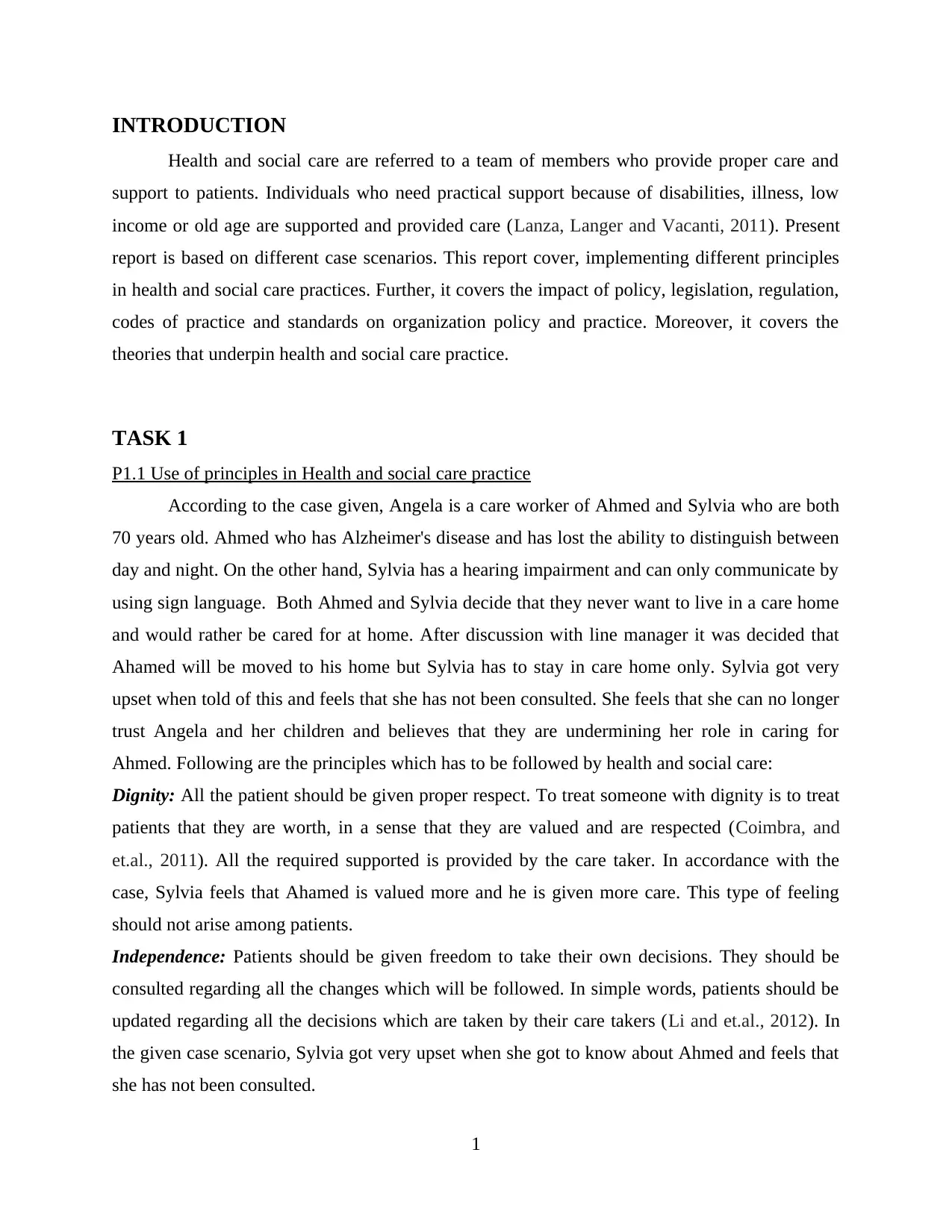
INTRODUCTION
Health and social care are referred to a team of members who provide proper care and
support to patients. Individuals who need practical support because of disabilities, illness, low
income or old age are supported and provided care (Lanza, Langer and Vacanti, 2011). Present
report is based on different case scenarios. This report cover, implementing different principles
in health and social care practices. Further, it covers the impact of policy, legislation, regulation,
codes of practice and standards on organization policy and practice. Moreover, it covers the
theories that underpin health and social care practice.
TASK 1
P1.1 Use of principles in Health and social care practice
According to the case given, Angela is a care worker of Ahmed and Sylvia who are both
70 years old. Ahmed who has Alzheimer's disease and has lost the ability to distinguish between
day and night. On the other hand, Sylvia has a hearing impairment and can only communicate by
using sign language. Both Ahmed and Sylvia decide that they never want to live in a care home
and would rather be cared for at home. After discussion with line manager it was decided that
Ahamed will be moved to his home but Sylvia has to stay in care home only. Sylvia got very
upset when told of this and feels that she has not been consulted. She feels that she can no longer
trust Angela and her children and believes that they are undermining her role in caring for
Ahmed. Following are the principles which has to be followed by health and social care:
Dignity: All the patient should be given proper respect. To treat someone with dignity is to treat
patients that they are worth, in a sense that they are valued and are respected (Coimbra, and
et.al., 2011). All the required supported is provided by the care taker. In accordance with the
case, Sylvia feels that Ahamed is valued more and he is given more care. This type of feeling
should not arise among patients.
Independence: Patients should be given freedom to take their own decisions. They should be
consulted regarding all the changes which will be followed. In simple words, patients should be
updated regarding all the decisions which are taken by their care takers (Li and et.al., 2012). In
the given case scenario, Sylvia got very upset when she got to know about Ahmed and feels that
she has not been consulted.
1
Health and social care are referred to a team of members who provide proper care and
support to patients. Individuals who need practical support because of disabilities, illness, low
income or old age are supported and provided care (Lanza, Langer and Vacanti, 2011). Present
report is based on different case scenarios. This report cover, implementing different principles
in health and social care practices. Further, it covers the impact of policy, legislation, regulation,
codes of practice and standards on organization policy and practice. Moreover, it covers the
theories that underpin health and social care practice.
TASK 1
P1.1 Use of principles in Health and social care practice
According to the case given, Angela is a care worker of Ahmed and Sylvia who are both
70 years old. Ahmed who has Alzheimer's disease and has lost the ability to distinguish between
day and night. On the other hand, Sylvia has a hearing impairment and can only communicate by
using sign language. Both Ahmed and Sylvia decide that they never want to live in a care home
and would rather be cared for at home. After discussion with line manager it was decided that
Ahamed will be moved to his home but Sylvia has to stay in care home only. Sylvia got very
upset when told of this and feels that she has not been consulted. She feels that she can no longer
trust Angela and her children and believes that they are undermining her role in caring for
Ahmed. Following are the principles which has to be followed by health and social care:
Dignity: All the patient should be given proper respect. To treat someone with dignity is to treat
patients that they are worth, in a sense that they are valued and are respected (Coimbra, and
et.al., 2011). All the required supported is provided by the care taker. In accordance with the
case, Sylvia feels that Ahamed is valued more and he is given more care. This type of feeling
should not arise among patients.
Independence: Patients should be given freedom to take their own decisions. They should be
consulted regarding all the changes which will be followed. In simple words, patients should be
updated regarding all the decisions which are taken by their care takers (Li and et.al., 2012). In
the given case scenario, Sylvia got very upset when she got to know about Ahmed and feels that
she has not been consulted.
1
⊘ This is a preview!⊘
Do you want full access?
Subscribe today to unlock all pages.

Trusted by 1+ million students worldwide
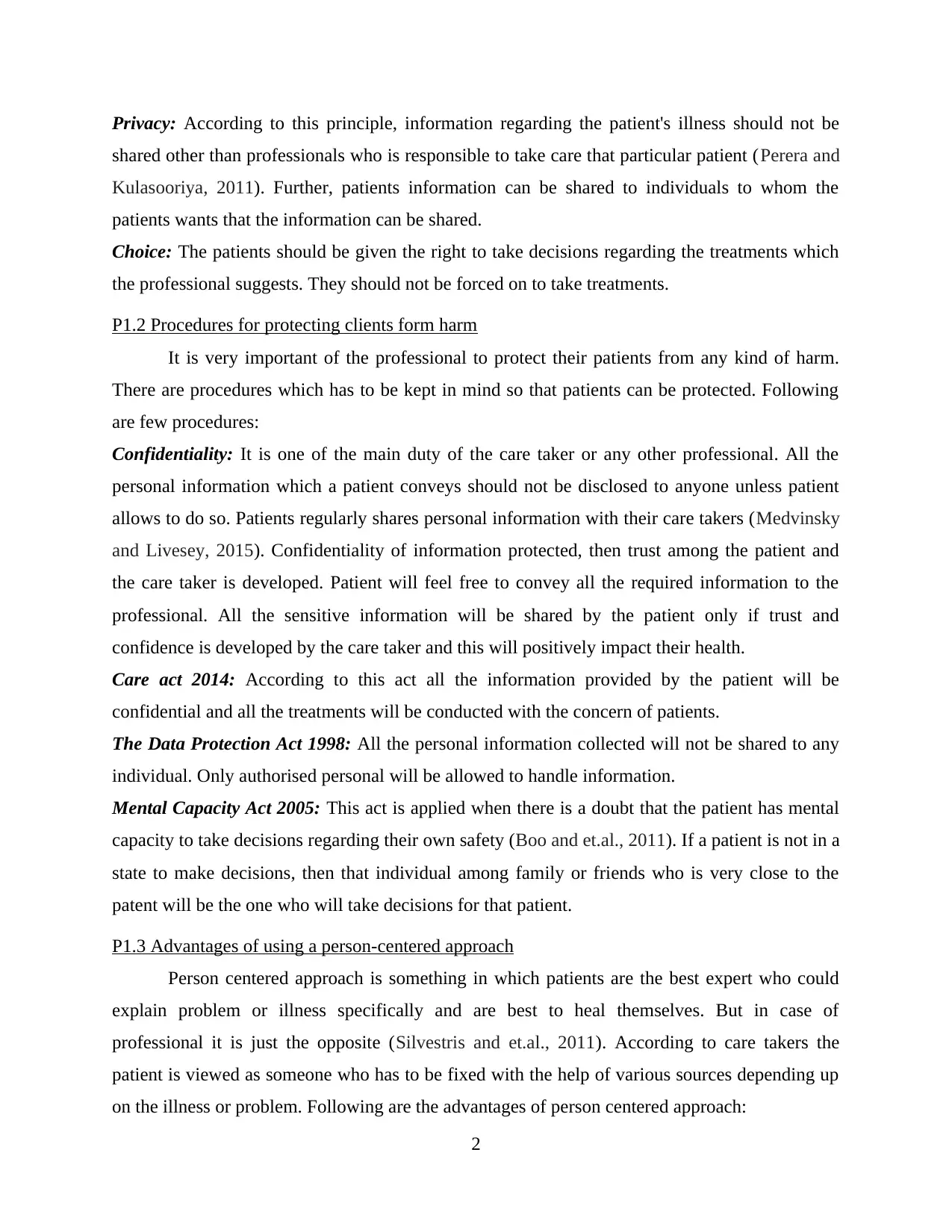
Privacy: According to this principle, information regarding the patient's illness should not be
shared other than professionals who is responsible to take care that particular patient (Perera and
Kulasooriya, 2011). Further, patients information can be shared to individuals to whom the
patients wants that the information can be shared.
Choice: The patients should be given the right to take decisions regarding the treatments which
the professional suggests. They should not be forced on to take treatments.
P1.2 Procedures for protecting clients form harm
It is very important of the professional to protect their patients from any kind of harm.
There are procedures which has to be kept in mind so that patients can be protected. Following
are few procedures:
Confidentiality: It is one of the main duty of the care taker or any other professional. All the
personal information which a patient conveys should not be disclosed to anyone unless patient
allows to do so. Patients regularly shares personal information with their care takers (Medvinsky
and Livesey, 2015). Confidentiality of information protected, then trust among the patient and
the care taker is developed. Patient will feel free to convey all the required information to the
professional. All the sensitive information will be shared by the patient only if trust and
confidence is developed by the care taker and this will positively impact their health.
Care act 2014: According to this act all the information provided by the patient will be
confidential and all the treatments will be conducted with the concern of patients.
The Data Protection Act 1998: All the personal information collected will not be shared to any
individual. Only authorised personal will be allowed to handle information.
Mental Capacity Act 2005: This act is applied when there is a doubt that the patient has mental
capacity to take decisions regarding their own safety (Boo and et.al., 2011). If a patient is not in a
state to make decisions, then that individual among family or friends who is very close to the
patent will be the one who will take decisions for that patient.
P1.3 Advantages of using a person-centered approach
Person centered approach is something in which patients are the best expert who could
explain problem or illness specifically and are best to heal themselves. But in case of
professional it is just the opposite (Silvestris and et.al., 2011). According to care takers the
patient is viewed as someone who has to be fixed with the help of various sources depending up
on the illness or problem. Following are the advantages of person centered approach:
2
shared other than professionals who is responsible to take care that particular patient (Perera and
Kulasooriya, 2011). Further, patients information can be shared to individuals to whom the
patients wants that the information can be shared.
Choice: The patients should be given the right to take decisions regarding the treatments which
the professional suggests. They should not be forced on to take treatments.
P1.2 Procedures for protecting clients form harm
It is very important of the professional to protect their patients from any kind of harm.
There are procedures which has to be kept in mind so that patients can be protected. Following
are few procedures:
Confidentiality: It is one of the main duty of the care taker or any other professional. All the
personal information which a patient conveys should not be disclosed to anyone unless patient
allows to do so. Patients regularly shares personal information with their care takers (Medvinsky
and Livesey, 2015). Confidentiality of information protected, then trust among the patient and
the care taker is developed. Patient will feel free to convey all the required information to the
professional. All the sensitive information will be shared by the patient only if trust and
confidence is developed by the care taker and this will positively impact their health.
Care act 2014: According to this act all the information provided by the patient will be
confidential and all the treatments will be conducted with the concern of patients.
The Data Protection Act 1998: All the personal information collected will not be shared to any
individual. Only authorised personal will be allowed to handle information.
Mental Capacity Act 2005: This act is applied when there is a doubt that the patient has mental
capacity to take decisions regarding their own safety (Boo and et.al., 2011). If a patient is not in a
state to make decisions, then that individual among family or friends who is very close to the
patent will be the one who will take decisions for that patient.
P1.3 Advantages of using a person-centered approach
Person centered approach is something in which patients are the best expert who could
explain problem or illness specifically and are best to heal themselves. But in case of
professional it is just the opposite (Silvestris and et.al., 2011). According to care takers the
patient is viewed as someone who has to be fixed with the help of various sources depending up
on the illness or problem. Following are the advantages of person centered approach:
2
Paraphrase This Document
Need a fresh take? Get an instant paraphrase of this document with our AI Paraphraser
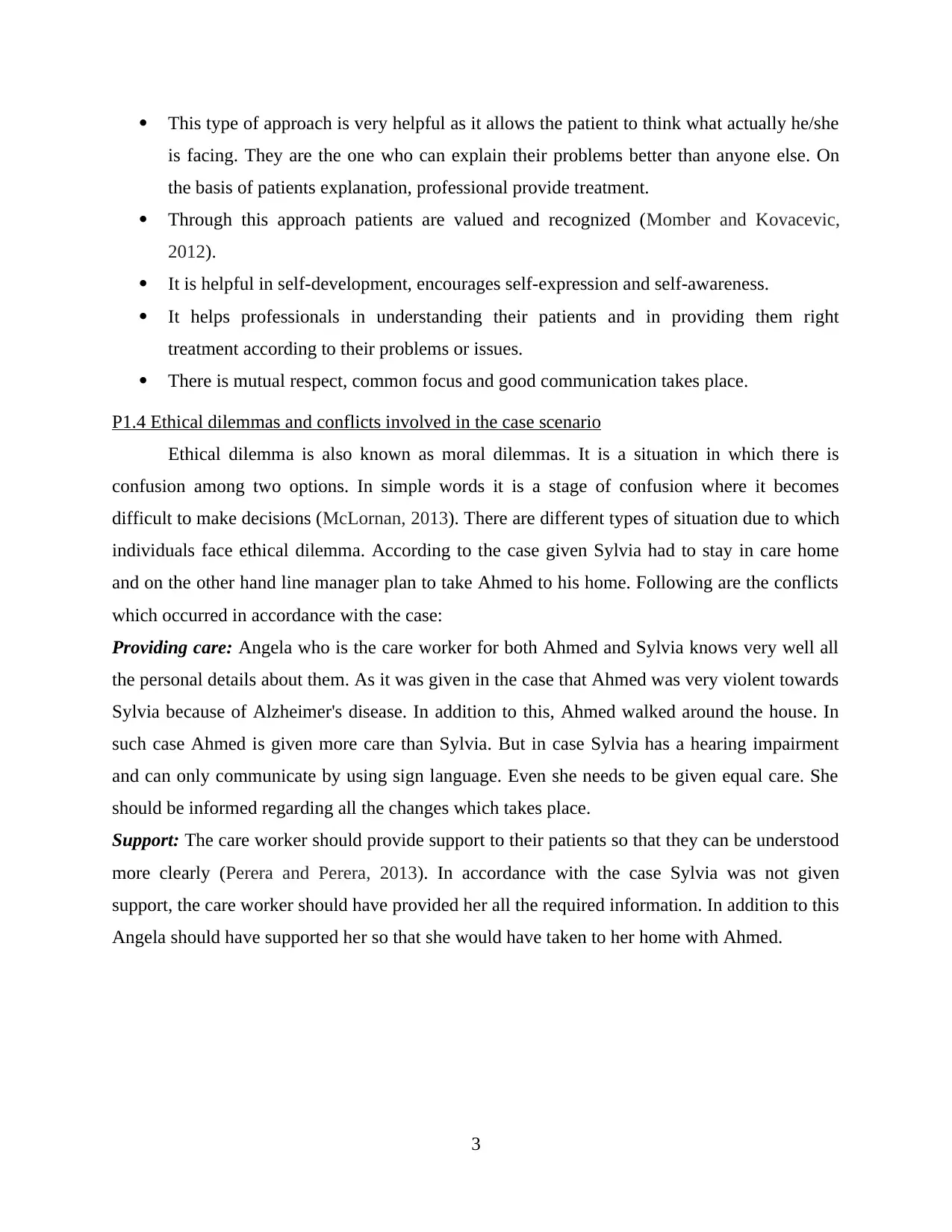
This type of approach is very helpful as it allows the patient to think what actually he/she
is facing. They are the one who can explain their problems better than anyone else. On
the basis of patients explanation, professional provide treatment.
Through this approach patients are valued and recognized (Momber and Kovacevic,
2012).
It is helpful in self-development, encourages self-expression and self-awareness.
It helps professionals in understanding their patients and in providing them right
treatment according to their problems or issues.
There is mutual respect, common focus and good communication takes place.
P1.4 Ethical dilemmas and conflicts involved in the case scenario
Ethical dilemma is also known as moral dilemmas. It is a situation in which there is
confusion among two options. In simple words it is a stage of confusion where it becomes
difficult to make decisions (McLornan, 2013). There are different types of situation due to which
individuals face ethical dilemma. According to the case given Sylvia had to stay in care home
and on the other hand line manager plan to take Ahmed to his home. Following are the conflicts
which occurred in accordance with the case:
Providing care: Angela who is the care worker for both Ahmed and Sylvia knows very well all
the personal details about them. As it was given in the case that Ahmed was very violent towards
Sylvia because of Alzheimer's disease. In addition to this, Ahmed walked around the house. In
such case Ahmed is given more care than Sylvia. But in case Sylvia has a hearing impairment
and can only communicate by using sign language. Even she needs to be given equal care. She
should be informed regarding all the changes which takes place.
Support: The care worker should provide support to their patients so that they can be understood
more clearly (Perera and Perera, 2013). In accordance with the case Sylvia was not given
support, the care worker should have provided her all the required information. In addition to this
Angela should have supported her so that she would have taken to her home with Ahmed.
3
is facing. They are the one who can explain their problems better than anyone else. On
the basis of patients explanation, professional provide treatment.
Through this approach patients are valued and recognized (Momber and Kovacevic,
2012).
It is helpful in self-development, encourages self-expression and self-awareness.
It helps professionals in understanding their patients and in providing them right
treatment according to their problems or issues.
There is mutual respect, common focus and good communication takes place.
P1.4 Ethical dilemmas and conflicts involved in the case scenario
Ethical dilemma is also known as moral dilemmas. It is a situation in which there is
confusion among two options. In simple words it is a stage of confusion where it becomes
difficult to make decisions (McLornan, 2013). There are different types of situation due to which
individuals face ethical dilemma. According to the case given Sylvia had to stay in care home
and on the other hand line manager plan to take Ahmed to his home. Following are the conflicts
which occurred in accordance with the case:
Providing care: Angela who is the care worker for both Ahmed and Sylvia knows very well all
the personal details about them. As it was given in the case that Ahmed was very violent towards
Sylvia because of Alzheimer's disease. In addition to this, Ahmed walked around the house. In
such case Ahmed is given more care than Sylvia. But in case Sylvia has a hearing impairment
and can only communicate by using sign language. Even she needs to be given equal care. She
should be informed regarding all the changes which takes place.
Support: The care worker should provide support to their patients so that they can be understood
more clearly (Perera and Perera, 2013). In accordance with the case Sylvia was not given
support, the care worker should have provided her all the required information. In addition to this
Angela should have supported her so that she would have taken to her home with Ahmed.
3
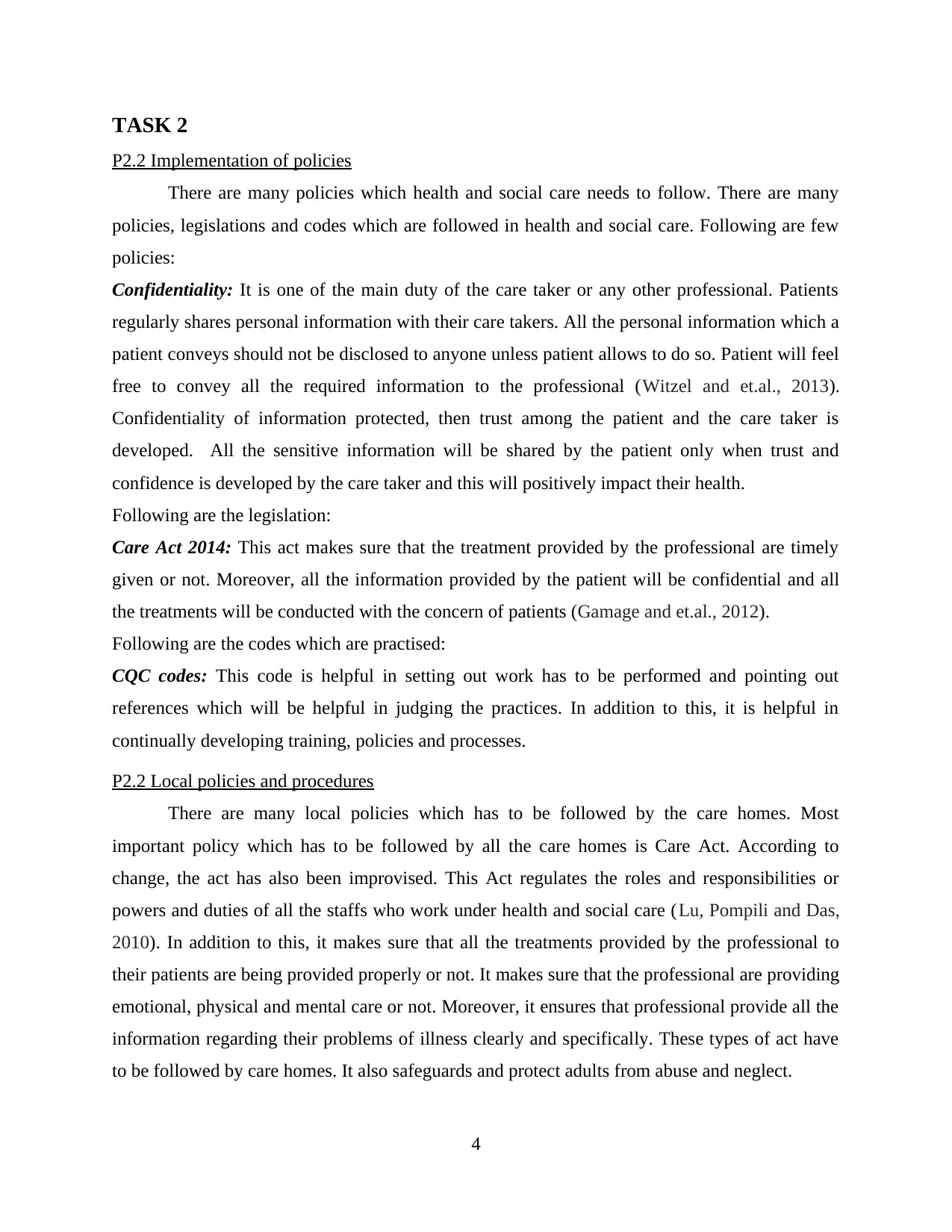
TASK 2
P2.2 Implementation of policies
There are many policies which health and social care needs to follow. There are many
policies, legislations and codes which are followed in health and social care. Following are few
policies:
Confidentiality: It is one of the main duty of the care taker or any other professional. Patients
regularly shares personal information with their care takers. All the personal information which a
patient conveys should not be disclosed to anyone unless patient allows to do so. Patient will feel
free to convey all the required information to the professional (Witzel and et.al., 2013).
Confidentiality of information protected, then trust among the patient and the care taker is
developed. All the sensitive information will be shared by the patient only when trust and
confidence is developed by the care taker and this will positively impact their health.
Following are the legislation:
Care Act 2014: This act makes sure that the treatment provided by the professional are timely
given or not. Moreover, all the information provided by the patient will be confidential and all
the treatments will be conducted with the concern of patients (Gamage and et.al., 2012).
Following are the codes which are practised:
CQC codes: This code is helpful in setting out work has to be performed and pointing out
references which will be helpful in judging the practices. In addition to this, it is helpful in
continually developing training, policies and processes.
P2.2 Local policies and procedures
There are many local policies which has to be followed by the care homes. Most
important policy which has to be followed by all the care homes is Care Act. According to
change, the act has also been improvised. This Act regulates the roles and responsibilities or
powers and duties of all the staffs who work under health and social care (Lu, Pompili and Das,
2010). In addition to this, it makes sure that all the treatments provided by the professional to
their patients are being provided properly or not. It makes sure that the professional are providing
emotional, physical and mental care or not. Moreover, it ensures that professional provide all the
information regarding their problems of illness clearly and specifically. These types of act have
to be followed by care homes. It also safeguards and protect adults from abuse and neglect.
4
P2.2 Implementation of policies
There are many policies which health and social care needs to follow. There are many
policies, legislations and codes which are followed in health and social care. Following are few
policies:
Confidentiality: It is one of the main duty of the care taker or any other professional. Patients
regularly shares personal information with their care takers. All the personal information which a
patient conveys should not be disclosed to anyone unless patient allows to do so. Patient will feel
free to convey all the required information to the professional (Witzel and et.al., 2013).
Confidentiality of information protected, then trust among the patient and the care taker is
developed. All the sensitive information will be shared by the patient only when trust and
confidence is developed by the care taker and this will positively impact their health.
Following are the legislation:
Care Act 2014: This act makes sure that the treatment provided by the professional are timely
given or not. Moreover, all the information provided by the patient will be confidential and all
the treatments will be conducted with the concern of patients (Gamage and et.al., 2012).
Following are the codes which are practised:
CQC codes: This code is helpful in setting out work has to be performed and pointing out
references which will be helpful in judging the practices. In addition to this, it is helpful in
continually developing training, policies and processes.
P2.2 Local policies and procedures
There are many local policies which has to be followed by the care homes. Most
important policy which has to be followed by all the care homes is Care Act. According to
change, the act has also been improvised. This Act regulates the roles and responsibilities or
powers and duties of all the staffs who work under health and social care (Lu, Pompili and Das,
2010). In addition to this, it makes sure that all the treatments provided by the professional to
their patients are being provided properly or not. It makes sure that the professional are providing
emotional, physical and mental care or not. Moreover, it ensures that professional provide all the
information regarding their problems of illness clearly and specifically. These types of act have
to be followed by care homes. It also safeguards and protect adults from abuse and neglect.
4
⊘ This is a preview!⊘
Do you want full access?
Subscribe today to unlock all pages.

Trusted by 1+ million students worldwide
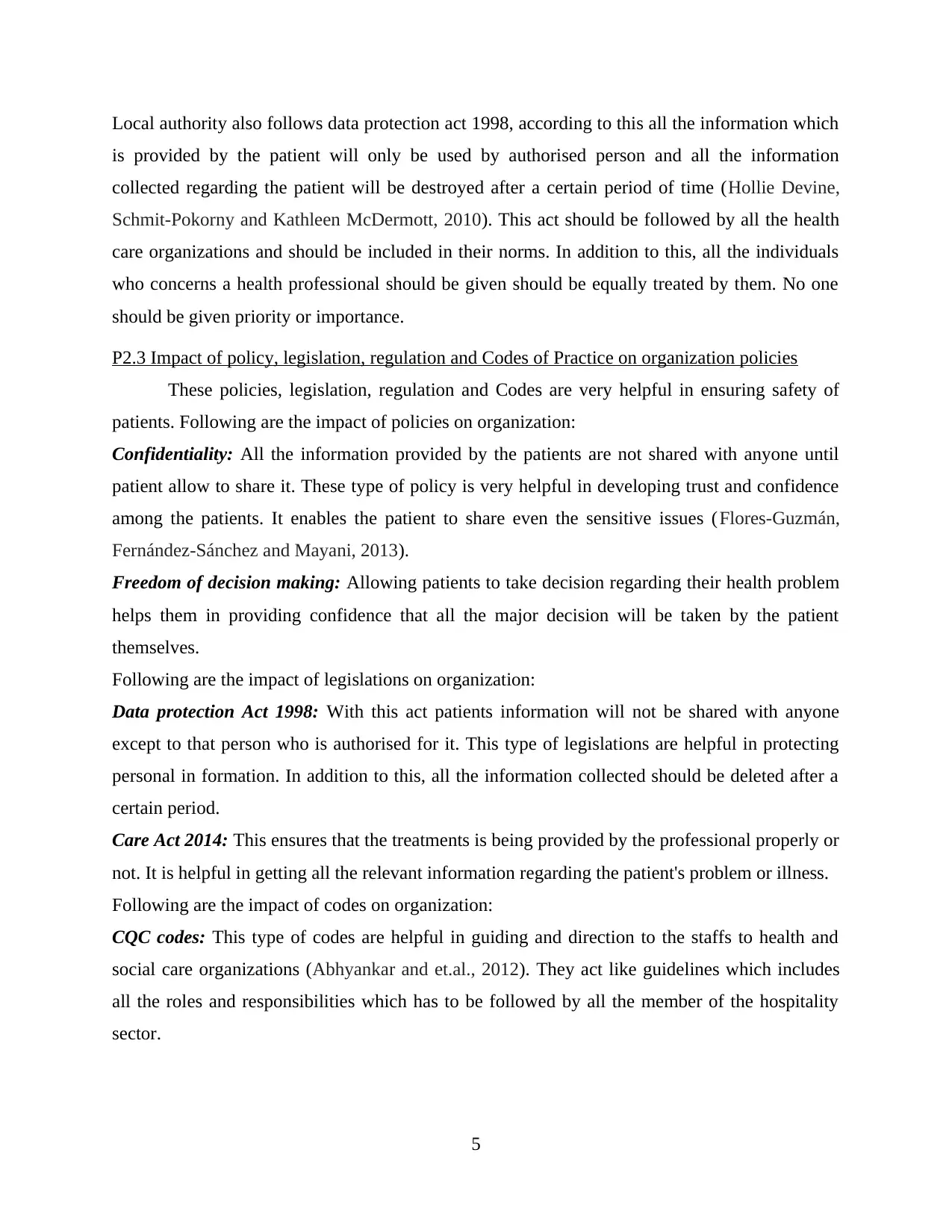
Local authority also follows data protection act 1998, according to this all the information which
is provided by the patient will only be used by authorised person and all the information
collected regarding the patient will be destroyed after a certain period of time (Hollie Devine,
Schmit-Pokorny and Kathleen McDermott, 2010). This act should be followed by all the health
care organizations and should be included in their norms. In addition to this, all the individuals
who concerns a health professional should be given should be equally treated by them. No one
should be given priority or importance.
P2.3 Impact of policy, legislation, regulation and Codes of Practice on organization policies
These policies, legislation, regulation and Codes are very helpful in ensuring safety of
patients. Following are the impact of policies on organization:
Confidentiality: All the information provided by the patients are not shared with anyone until
patient allow to share it. These type of policy is very helpful in developing trust and confidence
among the patients. It enables the patient to share even the sensitive issues (Flores-Guzmán,
Fernández-Sánchez and Mayani, 2013).
Freedom of decision making: Allowing patients to take decision regarding their health problem
helps them in providing confidence that all the major decision will be taken by the patient
themselves.
Following are the impact of legislations on organization:
Data protection Act 1998: With this act patients information will not be shared with anyone
except to that person who is authorised for it. This type of legislations are helpful in protecting
personal in formation. In addition to this, all the information collected should be deleted after a
certain period.
Care Act 2014: This ensures that the treatments is being provided by the professional properly or
not. It is helpful in getting all the relevant information regarding the patient's problem or illness.
Following are the impact of codes on organization:
CQC codes: This type of codes are helpful in guiding and direction to the staffs to health and
social care organizations (Abhyankar and et.al., 2012). They act like guidelines which includes
all the roles and responsibilities which has to be followed by all the member of the hospitality
sector.
5
is provided by the patient will only be used by authorised person and all the information
collected regarding the patient will be destroyed after a certain period of time (Hollie Devine,
Schmit-Pokorny and Kathleen McDermott, 2010). This act should be followed by all the health
care organizations and should be included in their norms. In addition to this, all the individuals
who concerns a health professional should be given should be equally treated by them. No one
should be given priority or importance.
P2.3 Impact of policy, legislation, regulation and Codes of Practice on organization policies
These policies, legislation, regulation and Codes are very helpful in ensuring safety of
patients. Following are the impact of policies on organization:
Confidentiality: All the information provided by the patients are not shared with anyone until
patient allow to share it. These type of policy is very helpful in developing trust and confidence
among the patients. It enables the patient to share even the sensitive issues (Flores-Guzmán,
Fernández-Sánchez and Mayani, 2013).
Freedom of decision making: Allowing patients to take decision regarding their health problem
helps them in providing confidence that all the major decision will be taken by the patient
themselves.
Following are the impact of legislations on organization:
Data protection Act 1998: With this act patients information will not be shared with anyone
except to that person who is authorised for it. This type of legislations are helpful in protecting
personal in formation. In addition to this, all the information collected should be deleted after a
certain period.
Care Act 2014: This ensures that the treatments is being provided by the professional properly or
not. It is helpful in getting all the relevant information regarding the patient's problem or illness.
Following are the impact of codes on organization:
CQC codes: This type of codes are helpful in guiding and direction to the staffs to health and
social care organizations (Abhyankar and et.al., 2012). They act like guidelines which includes
all the roles and responsibilities which has to be followed by all the member of the hospitality
sector.
5
Paraphrase This Document
Need a fresh take? Get an instant paraphrase of this document with our AI Paraphraser
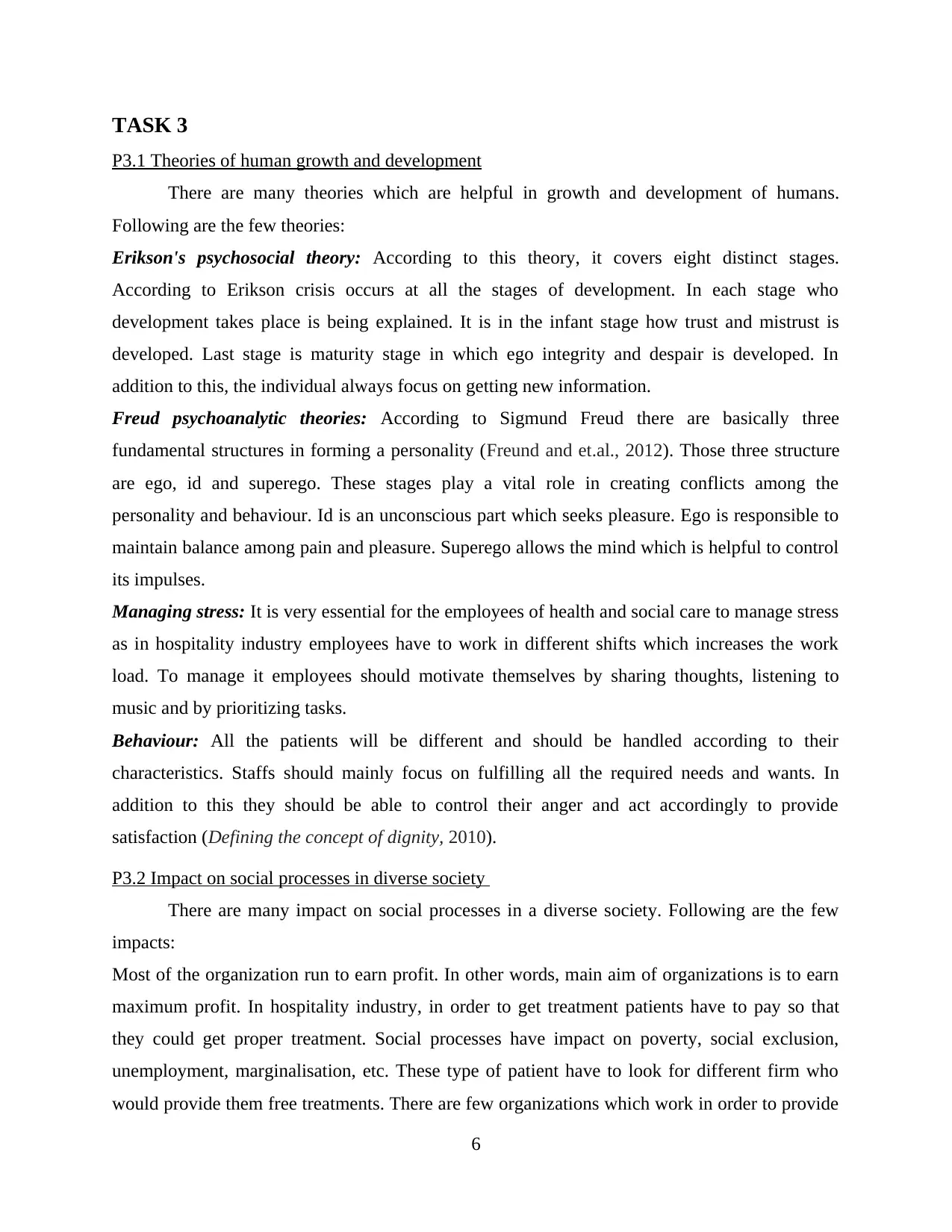
TASK 3
P3.1 Theories of human growth and development
There are many theories which are helpful in growth and development of humans.
Following are the few theories:
Erikson's psychosocial theory: According to this theory, it covers eight distinct stages.
According to Erikson crisis occurs at all the stages of development. In each stage who
development takes place is being explained. It is in the infant stage how trust and mistrust is
developed. Last stage is maturity stage in which ego integrity and despair is developed. In
addition to this, the individual always focus on getting new information.
Freud psychoanalytic theories: According to Sigmund Freud there are basically three
fundamental structures in forming a personality (Freund and et.al., 2012). Those three structure
are ego, id and superego. These stages play a vital role in creating conflicts among the
personality and behaviour. Id is an unconscious part which seeks pleasure. Ego is responsible to
maintain balance among pain and pleasure. Superego allows the mind which is helpful to control
its impulses.
Managing stress: It is very essential for the employees of health and social care to manage stress
as in hospitality industry employees have to work in different shifts which increases the work
load. To manage it employees should motivate themselves by sharing thoughts, listening to
music and by prioritizing tasks.
Behaviour: All the patients will be different and should be handled according to their
characteristics. Staffs should mainly focus on fulfilling all the required needs and wants. In
addition to this they should be able to control their anger and act accordingly to provide
satisfaction (Defining the concept of dignity, 2010).
P3.2 Impact on social processes in diverse society
There are many impact on social processes in a diverse society. Following are the few
impacts:
Most of the organization run to earn profit. In other words, main aim of organizations is to earn
maximum profit. In hospitality industry, in order to get treatment patients have to pay so that
they could get proper treatment. Social processes have impact on poverty, social exclusion,
unemployment, marginalisation, etc. These type of patient have to look for different firm who
would provide them free treatments. There are few organizations which work in order to provide
6
P3.1 Theories of human growth and development
There are many theories which are helpful in growth and development of humans.
Following are the few theories:
Erikson's psychosocial theory: According to this theory, it covers eight distinct stages.
According to Erikson crisis occurs at all the stages of development. In each stage who
development takes place is being explained. It is in the infant stage how trust and mistrust is
developed. Last stage is maturity stage in which ego integrity and despair is developed. In
addition to this, the individual always focus on getting new information.
Freud psychoanalytic theories: According to Sigmund Freud there are basically three
fundamental structures in forming a personality (Freund and et.al., 2012). Those three structure
are ego, id and superego. These stages play a vital role in creating conflicts among the
personality and behaviour. Id is an unconscious part which seeks pleasure. Ego is responsible to
maintain balance among pain and pleasure. Superego allows the mind which is helpful to control
its impulses.
Managing stress: It is very essential for the employees of health and social care to manage stress
as in hospitality industry employees have to work in different shifts which increases the work
load. To manage it employees should motivate themselves by sharing thoughts, listening to
music and by prioritizing tasks.
Behaviour: All the patients will be different and should be handled according to their
characteristics. Staffs should mainly focus on fulfilling all the required needs and wants. In
addition to this they should be able to control their anger and act accordingly to provide
satisfaction (Defining the concept of dignity, 2010).
P3.2 Impact on social processes in diverse society
There are many impact on social processes in a diverse society. Following are the few
impacts:
Most of the organization run to earn profit. In other words, main aim of organizations is to earn
maximum profit. In hospitality industry, in order to get treatment patients have to pay so that
they could get proper treatment. Social processes have impact on poverty, social exclusion,
unemployment, marginalisation, etc. These type of patient have to look for different firm who
would provide them free treatments. There are few organizations which work in order to provide
6
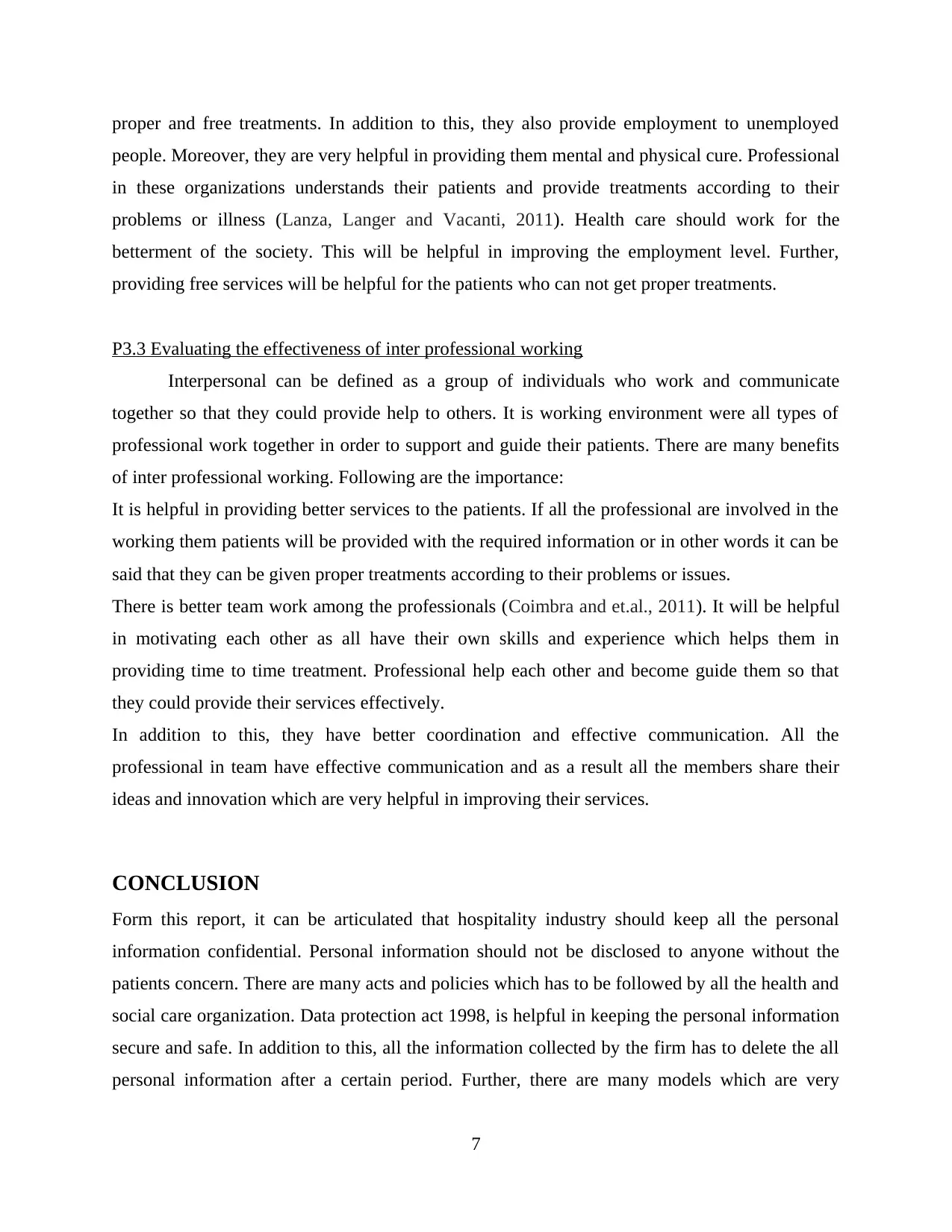
proper and free treatments. In addition to this, they also provide employment to unemployed
people. Moreover, they are very helpful in providing them mental and physical cure. Professional
in these organizations understands their patients and provide treatments according to their
problems or illness (Lanza, Langer and Vacanti, 2011). Health care should work for the
betterment of the society. This will be helpful in improving the employment level. Further,
providing free services will be helpful for the patients who can not get proper treatments.
P3.3 Evaluating the effectiveness of inter professional working
Interpersonal can be defined as a group of individuals who work and communicate
together so that they could provide help to others. It is working environment were all types of
professional work together in order to support and guide their patients. There are many benefits
of inter professional working. Following are the importance:
It is helpful in providing better services to the patients. If all the professional are involved in the
working them patients will be provided with the required information or in other words it can be
said that they can be given proper treatments according to their problems or issues.
There is better team work among the professionals (Coimbra and et.al., 2011). It will be helpful
in motivating each other as all have their own skills and experience which helps them in
providing time to time treatment. Professional help each other and become guide them so that
they could provide their services effectively.
In addition to this, they have better coordination and effective communication. All the
professional in team have effective communication and as a result all the members share their
ideas and innovation which are very helpful in improving their services.
CONCLUSION
Form this report, it can be articulated that hospitality industry should keep all the personal
information confidential. Personal information should not be disclosed to anyone without the
patients concern. There are many acts and policies which has to be followed by all the health and
social care organization. Data protection act 1998, is helpful in keeping the personal information
secure and safe. In addition to this, all the information collected by the firm has to delete the all
personal information after a certain period. Further, there are many models which are very
7
people. Moreover, they are very helpful in providing them mental and physical cure. Professional
in these organizations understands their patients and provide treatments according to their
problems or illness (Lanza, Langer and Vacanti, 2011). Health care should work for the
betterment of the society. This will be helpful in improving the employment level. Further,
providing free services will be helpful for the patients who can not get proper treatments.
P3.3 Evaluating the effectiveness of inter professional working
Interpersonal can be defined as a group of individuals who work and communicate
together so that they could provide help to others. It is working environment were all types of
professional work together in order to support and guide their patients. There are many benefits
of inter professional working. Following are the importance:
It is helpful in providing better services to the patients. If all the professional are involved in the
working them patients will be provided with the required information or in other words it can be
said that they can be given proper treatments according to their problems or issues.
There is better team work among the professionals (Coimbra and et.al., 2011). It will be helpful
in motivating each other as all have their own skills and experience which helps them in
providing time to time treatment. Professional help each other and become guide them so that
they could provide their services effectively.
In addition to this, they have better coordination and effective communication. All the
professional in team have effective communication and as a result all the members share their
ideas and innovation which are very helpful in improving their services.
CONCLUSION
Form this report, it can be articulated that hospitality industry should keep all the personal
information confidential. Personal information should not be disclosed to anyone without the
patients concern. There are many acts and policies which has to be followed by all the health and
social care organization. Data protection act 1998, is helpful in keeping the personal information
secure and safe. In addition to this, all the information collected by the firm has to delete the all
personal information after a certain period. Further, there are many models which are very
7
⊘ This is a preview!⊘
Do you want full access?
Subscribe today to unlock all pages.

Trusted by 1+ million students worldwide

helpful in personal growth and development. Among which Erikson's psychosocial theory
include eight stage in which change takes place or human growth and development takes place.
8
include eight stage in which change takes place or human growth and development takes place.
8
Paraphrase This Document
Need a fresh take? Get an instant paraphrase of this document with our AI Paraphraser
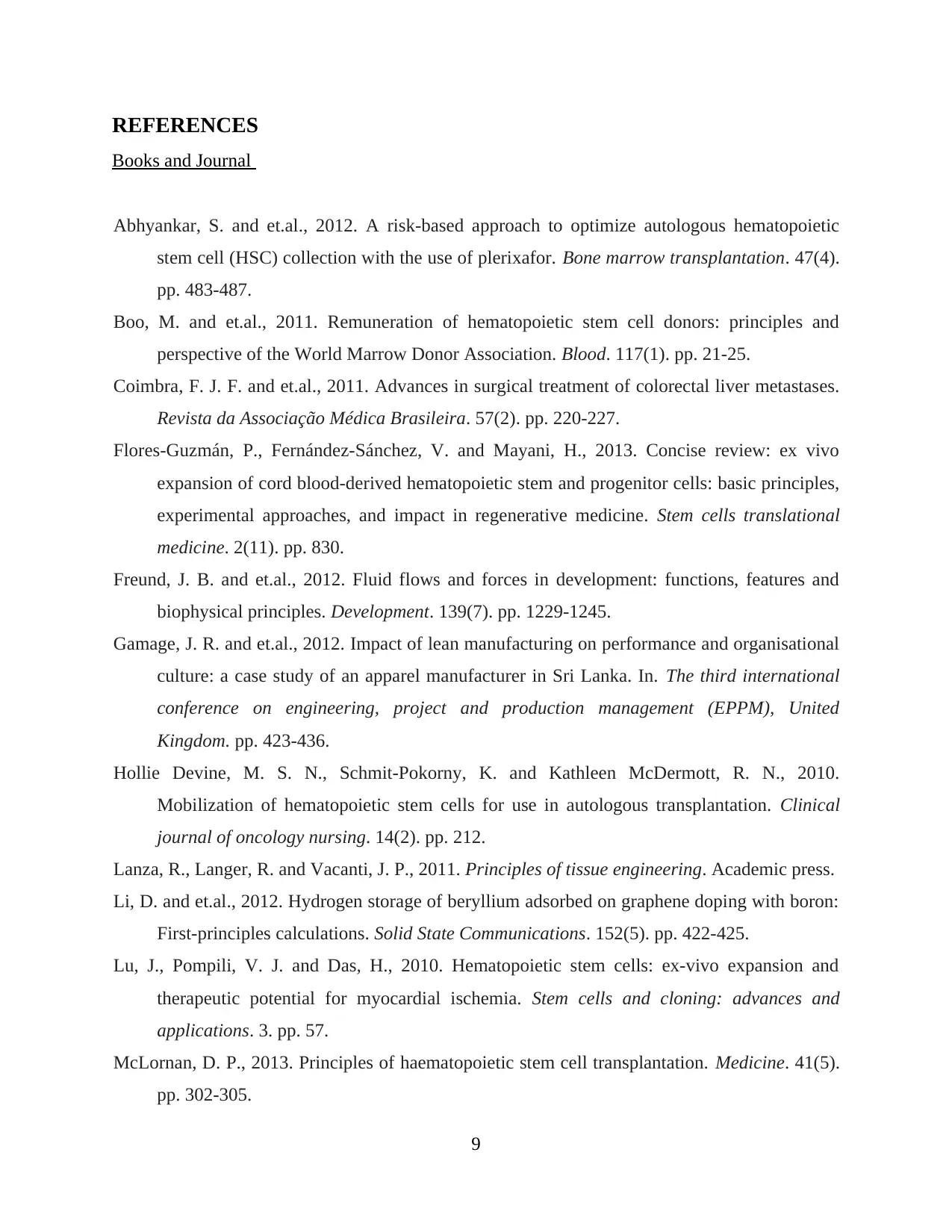
REFERENCES
Books and Journal
Abhyankar, S. and et.al., 2012. A risk-based approach to optimize autologous hematopoietic
stem cell (HSC) collection with the use of plerixafor. Bone marrow transplantation. 47(4).
pp. 483-487.
Boo, M. and et.al., 2011. Remuneration of hematopoietic stem cell donors: principles and
perspective of the World Marrow Donor Association. Blood. 117(1). pp. 21-25.
Coimbra, F. J. F. and et.al., 2011. Advances in surgical treatment of colorectal liver metastases.
Revista da Associação Médica Brasileira. 57(2). pp. 220-227.
Flores-Guzmán, P., Fernández-Sánchez, V. and Mayani, H., 2013. Concise review: ex vivo
expansion of cord blood-derived hematopoietic stem and progenitor cells: basic principles,
experimental approaches, and impact in regenerative medicine. Stem cells translational
medicine. 2(11). pp. 830.
Freund, J. B. and et.al., 2012. Fluid flows and forces in development: functions, features and
biophysical principles. Development. 139(7). pp. 1229-1245.
Gamage, J. R. and et.al., 2012. Impact of lean manufacturing on performance and organisational
culture: a case study of an apparel manufacturer in Sri Lanka. In. The third international
conference on engineering, project and production management (EPPM), United
Kingdom. pp. 423-436.
Hollie Devine, M. S. N., Schmit-Pokorny, K. and Kathleen McDermott, R. N., 2010.
Mobilization of hematopoietic stem cells for use in autologous transplantation. Clinical
journal of oncology nursing. 14(2). pp. 212.
Lanza, R., Langer, R. and Vacanti, J. P., 2011. Principles of tissue engineering. Academic press.
Li, D. and et.al., 2012. Hydrogen storage of beryllium adsorbed on graphene doping with boron:
First-principles calculations. Solid State Communications. 152(5). pp. 422-425.
Lu, J., Pompili, V. J. and Das, H., 2010. Hematopoietic stem cells: ex-vivo expansion and
therapeutic potential for myocardial ischemia. Stem cells and cloning: advances and
applications. 3. pp. 57.
McLornan, D. P., 2013. Principles of haematopoietic stem cell transplantation. Medicine. 41(5).
pp. 302-305.
9
Books and Journal
Abhyankar, S. and et.al., 2012. A risk-based approach to optimize autologous hematopoietic
stem cell (HSC) collection with the use of plerixafor. Bone marrow transplantation. 47(4).
pp. 483-487.
Boo, M. and et.al., 2011. Remuneration of hematopoietic stem cell donors: principles and
perspective of the World Marrow Donor Association. Blood. 117(1). pp. 21-25.
Coimbra, F. J. F. and et.al., 2011. Advances in surgical treatment of colorectal liver metastases.
Revista da Associação Médica Brasileira. 57(2). pp. 220-227.
Flores-Guzmán, P., Fernández-Sánchez, V. and Mayani, H., 2013. Concise review: ex vivo
expansion of cord blood-derived hematopoietic stem and progenitor cells: basic principles,
experimental approaches, and impact in regenerative medicine. Stem cells translational
medicine. 2(11). pp. 830.
Freund, J. B. and et.al., 2012. Fluid flows and forces in development: functions, features and
biophysical principles. Development. 139(7). pp. 1229-1245.
Gamage, J. R. and et.al., 2012. Impact of lean manufacturing on performance and organisational
culture: a case study of an apparel manufacturer in Sri Lanka. In. The third international
conference on engineering, project and production management (EPPM), United
Kingdom. pp. 423-436.
Hollie Devine, M. S. N., Schmit-Pokorny, K. and Kathleen McDermott, R. N., 2010.
Mobilization of hematopoietic stem cells for use in autologous transplantation. Clinical
journal of oncology nursing. 14(2). pp. 212.
Lanza, R., Langer, R. and Vacanti, J. P., 2011. Principles of tissue engineering. Academic press.
Li, D. and et.al., 2012. Hydrogen storage of beryllium adsorbed on graphene doping with boron:
First-principles calculations. Solid State Communications. 152(5). pp. 422-425.
Lu, J., Pompili, V. J. and Das, H., 2010. Hematopoietic stem cells: ex-vivo expansion and
therapeutic potential for myocardial ischemia. Stem cells and cloning: advances and
applications. 3. pp. 57.
McLornan, D. P., 2013. Principles of haematopoietic stem cell transplantation. Medicine. 41(5).
pp. 302-305.
9
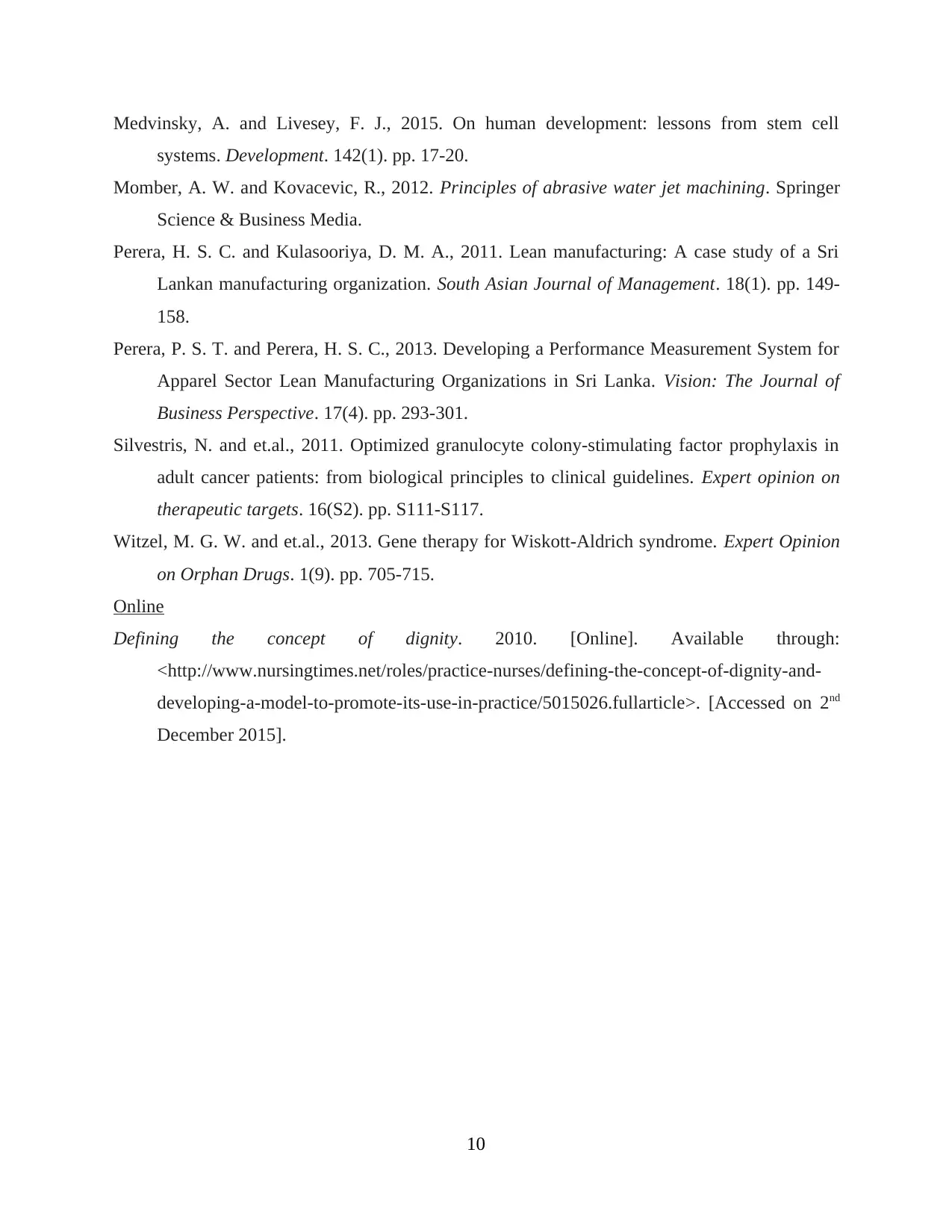
Medvinsky, A. and Livesey, F. J., 2015. On human development: lessons from stem cell
systems. Development. 142(1). pp. 17-20.
Momber, A. W. and Kovacevic, R., 2012. Principles of abrasive water jet machining. Springer
Science & Business Media.
Perera, H. S. C. and Kulasooriya, D. M. A., 2011. Lean manufacturing: A case study of a Sri
Lankan manufacturing organization. South Asian Journal of Management. 18(1). pp. 149-
158.
Perera, P. S. T. and Perera, H. S. C., 2013. Developing a Performance Measurement System for
Apparel Sector Lean Manufacturing Organizations in Sri Lanka. Vision: The Journal of
Business Perspective. 17(4). pp. 293-301.
Silvestris, N. and et.al., 2011. Optimized granulocyte colony-stimulating factor prophylaxis in
adult cancer patients: from biological principles to clinical guidelines. Expert opinion on
therapeutic targets. 16(S2). pp. S111-S117.
Witzel, M. G. W. and et.al., 2013. Gene therapy for Wiskott-Aldrich syndrome. Expert Opinion
on Orphan Drugs. 1(9). pp. 705-715.
Online
Defining the concept of dignity. 2010. [Online]. Available through:
<http://www.nursingtimes.net/roles/practice-nurses/defining-the-concept-of-dignity-and-
developing-a-model-to-promote-its-use-in-practice/5015026.fullarticle>. [Accessed on 2nd
December 2015].
10
systems. Development. 142(1). pp. 17-20.
Momber, A. W. and Kovacevic, R., 2012. Principles of abrasive water jet machining. Springer
Science & Business Media.
Perera, H. S. C. and Kulasooriya, D. M. A., 2011. Lean manufacturing: A case study of a Sri
Lankan manufacturing organization. South Asian Journal of Management. 18(1). pp. 149-
158.
Perera, P. S. T. and Perera, H. S. C., 2013. Developing a Performance Measurement System for
Apparel Sector Lean Manufacturing Organizations in Sri Lanka. Vision: The Journal of
Business Perspective. 17(4). pp. 293-301.
Silvestris, N. and et.al., 2011. Optimized granulocyte colony-stimulating factor prophylaxis in
adult cancer patients: from biological principles to clinical guidelines. Expert opinion on
therapeutic targets. 16(S2). pp. S111-S117.
Witzel, M. G. W. and et.al., 2013. Gene therapy for Wiskott-Aldrich syndrome. Expert Opinion
on Orphan Drugs. 1(9). pp. 705-715.
Online
Defining the concept of dignity. 2010. [Online]. Available through:
<http://www.nursingtimes.net/roles/practice-nurses/defining-the-concept-of-dignity-and-
developing-a-model-to-promote-its-use-in-practice/5015026.fullarticle>. [Accessed on 2nd
December 2015].
10
⊘ This is a preview!⊘
Do you want full access?
Subscribe today to unlock all pages.

Trusted by 1+ million students worldwide
1 out of 12
Related Documents
Your All-in-One AI-Powered Toolkit for Academic Success.
+13062052269
info@desklib.com
Available 24*7 on WhatsApp / Email
![[object Object]](/_next/static/media/star-bottom.7253800d.svg)
Unlock your academic potential
Copyright © 2020–2026 A2Z Services. All Rights Reserved. Developed and managed by ZUCOL.





